Connected Development (CODE), a Civil Society Organization (CSO), has released a pre-election security assessment report and electoral intelligence technologies for the monitoring of the 2023 elections.
At the unveiling in Abuja, Mr Hamzat Lawal, Chief Executive Officer CODE, stated that the study titled “Same Currency for Violence; Troubling Elections” and the EI electoral monitoring tool were initiatives under its “Uzabe” platform.
According to Lawal, CODE actively participated in election observation in Nigeria’s 2015 and 2019 general elections, deploying over 10,000 observers in both polls, using the Uzabe platform.
He stated that during the 2023 elections, CODE would deploy 20,000 community-based observers to submit real-time situation reports from local polling stations using two of its channels to provide structured and unstructured data, leveraging the Uzabe platform.
Read also: NCC announces toll-free incident hotline for 2023 presidential election
CODE’s Concerns About Nigeria’s 2023 Elections
Lawal explained that the group is focused on Nigeria’s 2023 election processes to ensure free and fair polls. The group also expressed concern about the Central Bank of Nigeria’s naira redesign approach to reduce corrupt practices during election and the resultant effect on voter turnout.
“CODE is not interested in the result of the elections but interested in the processes of the elections to ensure that INEC’s guidelines are adequately met in this election.
“The high rate of insecurity as well as the cash crunch due to the Central Bank’s currency redesign policy has escalated the tension causing growing fears, and might impact voter turnout, and as well cause voter apathy among Nigerians.
“We know that corrupt politicians were planning to leverage on this situation to further induce voters, and we are scared that Nigerians may have no option than to sell their votes on election day because of the impact of access to naira.
“One area we are also concerned about is the fact that INEC, looking at the Nigerian Electoral Act 2022 as amended, has the powers to postpone this election on the possibility of breach of peace and security.”
Lawal stated that CODE was also collaborating with Meta to assist combat fake news on social media that might circulate on election day.
He explained that CODE would work with security agencies and other stakeholders to use the platform to gain security insights and enhance security circumstances. He said the CODE will have a situation room on Friday, February 24th, which will include additional CSOs.
Also addressing, Mr. Emmanuel Njoku, Director of Democracy and Governance, CODE, advocated for an increase in voting duration in Nigeria from six to eight hours.
Njoku stated that during the just ended 2022 Elections, Kenya used technology comparable to the Bimodal Voter Accreditation System (BVAS).
He stated that Kenya’s voting populace of approximately 22 million had 11-12 hours to vote.
“Still, Nigeria with a larger population of registered voters allocated only six hours for voters to carry out their civic responsibility.”
Likewise, CODE hosted a roundtable discussion with media and civil society organizations to encourage collaboration on effective election coverage and reporting in 2023.
The roundtable discussion focused on how CSOs and media professionals could protect the integrity of the electoral process and the upcoming elections.
Directors and representatives from several CSOs attended the event, including the International Centre for Investigative Reporting (ICIR), the Civil Society Legislative Advocacy Centre (CISLAC), and the Centre for Democracy and Development (CDD).
SERAP, Accountability Lab, Radio Now, Citizen FM, Ready to Lead Africa, and other renowned media and civil society organizations were among the others.
CODE and media organizations signed a memorandum of understanding (MOU) to facilitate cooperation efforts to combat fake news, misinformation, and disinformation that have the potential to severely impact the 2023 elections.
Nigeria’s Upcoming General Election Dates
Nigerians will head to the polls on Saturday 25th February to elect their next president amid pressure of cash scarcity. On Saturday, 11th March 2023, gubernatorial elections will be held across 28 states of the Federation, as well as state Houses of Assembly elections in the 36 states in Nigeria.
Later in the year three other governorship polls will be conducted, while possible rerun elections for regularly planned elections that were cancelled are expected to be held.




